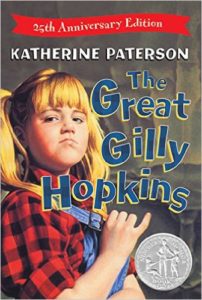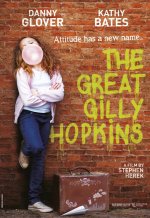Though probably the most honored children’s writer of her generation, Katherine Paterson hasn’t seen many of her books translated to film. This weekend will be only the second time, which makes today a good time to talk about it:
At the close of the Vietnam war, John and Katherine Paterson of Barre, Vermont agreed to serve as foster parents for two Cambodian brothers who had arrived in the US as refugees. The experience turned out to be painful and humbling, especially when Mrs. Paterson recognized that the attitude she developed toward these troubled, difficult boys was anything but kind. “I was treating two human beings as though they were disposable, which is why crimes are committed and wars are fought—someone thinks someone else is disposable.” Considering what that might feel like from a child’s point of view led her to start on a manuscript that became The Great Gilly Hopkins, whose troublesome, demanding, and vulnerable title character has goaded readers ever since.
All Galadriel (Gilly) knows of her mother is a snapshot of a dreamy-eyed flower child and an  occasional postcard signed “All my love, Courtney.” It’s enough to feed a steady fantasy of All-my-love Courtney sweeping into Gilly’s life someday to rescue her from a series of foster homes. In the meantime, the preteen girl sets out to make life as difficult as possible for her temporary parents, telling herself, “I can’t go soft—not as long as I’m nobody’s little girl—not while I’m just something to play musical chairs with.” The parents who hurt most were not the mean ones, but the ones who hugged and cuddled her and left her behind when they moved to Florida. Once burned, twice shy—and thrice determined to stay one step ahead of whatever Child Protective Services can throw at her. “She could stand anything—as long as she was in charge.”
occasional postcard signed “All my love, Courtney.” It’s enough to feed a steady fantasy of All-my-love Courtney sweeping into Gilly’s life someday to rescue her from a series of foster homes. In the meantime, the preteen girl sets out to make life as difficult as possible for her temporary parents, telling herself, “I can’t go soft—not as long as I’m nobody’s little girl—not while I’m just something to play musical chairs with.” The parents who hurt most were not the mean ones, but the ones who hugged and cuddled her and left her behind when they moved to Florida. Once burned, twice shy—and thrice determined to stay one step ahead of whatever Child Protective Services can throw at her. “She could stand anything—as long as she was in charge.”
But Gilly doesn’t know what to make of Maime Trotter, a Jesus-praising, sloppy-kissing widow the size of a hippo, with a heart to match. Trotter actually seems determined to love the girl no matter what, in spite of sulkiness, rudeness and all-around bad behavior. To her other unattractive qualities Gilly adds bigotry–it seems to her that fate is especially cruel to park her next door to an elderly black man (who has to come over for dinner every night) and stick her in a sixth-grade class taught by a “colored” teacher who takes no backtalk.
Now, the standard happy ending would have Gilly eventually laying down her arms, adjusting her attitude, and finding a permanent home in Trotter’s unconventional household, but it’s not to be. In a surprising twist, she is thwarted by her own willful actions. Even so, love has unlocked the barred gates and Trotter’s simple but powerful faith has found its target, leading Gilly to rethink some of her hardened views.
Katherine Paterson was already a highly respected author when the novel was published, having won a National Book Award in 1977 for The Master Puppeteer and the 1978 Newbery Medal for The Bridge to Terabithia. The Great Gilly Hopkins won both the National Book Award and a Newbery honor in 1979, and was almost immediately shuffled on to numerous “banned books” lists. That is, the book was never actually banned, but some people, mostly parents, raised objections. The flashpoint was Gilly herself—her terrible attitude and a mouth of the sort our great-grandmothers would have washed out with soap.
 The profanity is mild, but for the record there’s a lot of “hell” (about 15 instances), some “damn” (five or six), and much taking of God’s name in vain, though almost all of it in lower case, and corrected by Trotter. A real-life Gilly, as smart and put-upon as the fictional one, would say a lot worse—we all recognize that, but still the language has its effect. Paterson famously defended her choice of words this way: “Gilly is a lost child who lies, steals, bullies, despises those who are different or perceived to be weaker—a child like this does not say ‘fiddlesticks’ when frustrated.”
The profanity is mild, but for the record there’s a lot of “hell” (about 15 instances), some “damn” (five or six), and much taking of God’s name in vain, though almost all of it in lower case, and corrected by Trotter. A real-life Gilly, as smart and put-upon as the fictional one, would say a lot worse—we all recognize that, but still the language has its effect. Paterson famously defended her choice of words this way: “Gilly is a lost child who lies, steals, bullies, despises those who are different or perceived to be weaker—a child like this does not say ‘fiddlesticks’ when frustrated.”
“Children are not born magnanimous, they are born small,” she said in another context. “They have to grow into persons large enough to be able to love their neighbors, not to speak of their enemies.” In the course of the novel, Gilly begins to grow. I believe the virtues of her story far outweigh the legitimate concerns about her language, but readers who are around the age of the title character should be prepared for it. It’s not a comic or adventure novel. Though touches of humor keep the mood from being oppressive, it’s a serious novel, and children need to be taught how to read serious fiction seriously. (Many of the kids’ reviews on this site show a lack of comprehension.) This is a good novel to think about and ask questions about. Such as
- How does Gilly change during the course of the story? How can you tell? Do you think the change is too easy or quick?
- If she were in your class or Sunday school, would you try to make friends with her?
- In the book’s last scene, Trotter says this: “Sometimes in this world things come easy, and you tend to lean back and say, ‘Well, finally, happy ending. This is the way things is supposed to be.’ Like life owed you good things. . . . But you just fool yourself if you expect good things all the time. They ain’t what’s regular—don’t nobody owe ‘em to you.” Do you think she’s right?
- Trotter never explains the gospel to Gilly—does she live it?
- Katherine Paterson wrote that the character she identified with most was William Earnest, the frightened, shy little boy who becomes Gilly’s foster brother. Who would you identify with?
- In the last chapter, Gilly realizes she “had thrown away her whole life for a stinking lie.” What was the lie, and why do you think she was so willing to believe it, in spite of the evidence? Can you think of other lies people believe, in spite of the evidence (see Romans 1:19-23)?
- After reading this book, would you like to see the movie? And if you see the movie, how is it different from the book?
Support our writers and help keep Redeemed Reader ad-free by joining the Redeemed Reader Fellowship.
Stay Up to Date!
Get the information you need to make wise choices about books for your children and teens.
Our weekly newsletter includes our latest reviews, related links from around the web, a featured book list, book trivia, and more. We never sell your information. You may unsubscribe at any time.
We'd love to hear from you!
Our comments are now limited to our members (both Silver and Golden Key). Members, you just need to log in with your normal log-in credentials!
Not a member yet? You can join the Silver Key ($2.99/month) for a free 2-week trial. Cancel at any time. Find out more about membership here.
3 Comments
Leave a Comment
You must be logged in to post a comment.


Thank you for this review. My 9 year old daughter was reading this book for an independent reading assessment. It was only done at school, so I was not able to be part of the decision in choosing this book. I have never read it, but will now. My daughter came home to tell me she was uncomfortable with the language in the book. I love that you say the virtues of the story outweigh the legitimate concerns about her language. I am not opposed to my children reading these kinds of books, but I agree that they should be prepared to do so and I wish the teacher recognized that. I don’t think she was prepared for what was coming. We asked that she stop reading it at this point in her life. She’s happy to not finish the story, she wasn’t ready. Thank you again. I’ll be following this site more regularly. We should all read literature with discernment.
Hi Rebecca! I really think nine years old is too young for The Great Gilly Hopkins. It’s a worthwhile read for an older child, but as you suggest, a young reader should be prepared for it. Some useful discussion about language and how we use it could follow.
We just finished reading this in my family book club and we all absolutely loved it. The youngest reader is 8 years old and the oldest is 42 years old.
I enjoyed the realistic ending instead of the fairy tale we’ve all come to expect-which ends up giving us so much disappointment when we face real life situations. The language didn’t bother any of us. Our kids hear so much worse today, even from our current leaders. We were much more concerned with analyzing Gilly’s actions than the words she used while taking those actions.
This is a teachable book for any age-themes ranging from loss, growth, expectations, and family.